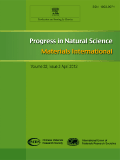
Progress in Natural Science-Materials International
Scope & Guideline
Fostering Global Knowledge Sharing in Materials Research
Introduction
Aims and Scopes
- Materials Synthesis and Characterization:
The journal consistently publishes research on novel synthesis techniques and characterization methods for advanced materials, including nanomaterials, composites, and alloys, highlighting their properties and potential applications. - Energy Storage and Conversion:
A significant focus is on materials for energy applications, particularly lithium-ion batteries, fuel cells, and hydrogen storage solutions, contributing to the advancement of sustainable energy technologies. - Environmental and Waste Management:
Research on the utilization of waste materials and the development of eco-friendly materials for environmental remediation demonstrates the journal's commitment to sustainability and waste management. - Functional Materials Engineering:
The journal covers a wide range of functional materials, including catalysts, sensors, and photonic materials, exploring their engineering and applications in various technological fields. - Metallurgy and Alloys:
A core area includes the study of metallic and alloy materials, focusing on processing techniques, mechanical properties, and performance under various conditions, which is crucial for industrial applications.
Trending and Emerging
- Nanomaterials and Nanocomposites:
There is a growing emphasis on the development and application of nanomaterials and nanocomposites due to their unique properties and potential uses in various high-tech applications. - Sustainable and Green Materials:
Research focusing on sustainable materials, including biodegradable polymers and materials derived from waste, is increasingly prominent, aligning with global sustainability goals. - Advanced Energy Materials:
Emerging themes include the development of advanced materials for energy storage and conversion technologies, particularly in the context of renewable energy solutions and battery technology. - Smart and Functional Coatings:
There is a notable increase in studies on smart materials and functional coatings that respond to environmental stimuli, indicating a trend towards multifunctional materials. - Additive Manufacturing and 3D Printing:
Research related to additive manufacturing techniques and their applications in materials science is on the rise, reflecting the growing interest in innovative fabrication methods.
Declining or Waning
- Traditional Ceramic Materials:
Research on conventional ceramic materials appears to be decreasing, possibly due to the emergence of more advanced materials and composites that offer enhanced properties and functionalities. - Basic Theoretical Studies:
Papers focusing solely on theoretical models without experimental validation are less frequent, suggesting a shift towards more applied research that demonstrates practical applications of materials. - Biomaterials for Medical Applications:
Although still relevant, the frequency of publications on biomaterials specifically for medical applications has diminished, possibly due to the rise of interdisciplinary studies integrating biomaterials with other fields. - Conventional Polymers:
Research on standard polymers without innovative modifications or applications is waning, as the focus shifts towards advanced polymer composites and smart materials with enhanced properties. - Niche Applications of Materials:
Studies targeting niche applications in materials science have decreased, indicating a trend towards broader applications that have more significant industrial and technological implications.
Similar Journals

Journal of Physics-Materials
Fostering Global Collaboration in Material ResearchJournal of Physics-Materials, published by IOP Publishing Ltd, serves as a leading platform for disseminating groundbreaking research in the realms of Atomic and Molecular Physics, Condensed Matter Physics, and Materials Science. This Open Access journal, established in 2018, enables wide-reaching visibility and accessibility to high-impact studies, fostering international collaboration and innovation within the scientific community. With a remarkable Q1 ranking in prestigious categories and impressive Scopus rankings—positioned at #38 in Condensed Matter Physics and #29 in Atomic and Molecular Physics—this journal plays a pivotal role in shaping contemporary research and discussions in physics and materials science. Researchers, students, and professionals alike are encouraged to contribute to and engage with the rich knowledge base this journal offers, which is dedicated to advancing the frontier of materials research and its numerous applications.
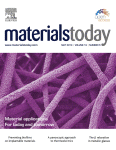
Materials Today
Fostering Collaboration in the World of MaterialsMaterials Today is a premier academic journal published by Elsevier Science Ltd, specializing in the dynamic fields of materials science, mechanical engineering, and condensed matter physics. Established in 1999, the journal has garnered an enviable reputation, consistently ranking in the Q1 category across multiple disciplines including mechanics of materials and general materials science, reflecting its influence and high-quality research output. With an impressive Scopus ranking—4th in both mechanical engineering and mechanics of materials, and 6th in condensed matter physics—Materials Today serves as an essential resource for researchers, professionals, and students seeking to stay at the forefront of developments in material innovations and applications. The journal is known for its commitment to publishing significant research findings and reviews, making it a vital platform for disseminating knowledge and fostering collaboration in the rapidly evolving materials field. Although it does not offer open access, its robust impact factor underscores the importance of the content published, ensuring wide visibility and citation among the academic community. Explore the rich tapestry of materials research with Materials Today, where groundbreaking insights pave the way for future technological advancements.
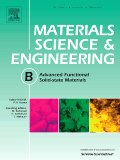
Materials Science and Engineering B-Advanced Functional Solid-State Materials
Advancing the Future of Solid-State MaterialsMaterials Science and Engineering B: Advanced Functional Solid-State Materials, published by Elsevier, stands as a pivotal platform in the realm of materials science, focusing on the development and characterization of advanced solid-state materials. With an ISSN of 0921-5107 and E-ISSN of 1873-4944, this journal operates out of the United Kingdom and addresses critical issues in condensed matter physics, mechanical engineering, and mechanics of materials. Its consistent recognition, evident in its Q2 quartile rankings across multiple engineering and physics categories and a respectable scope of convergence from 1988 to 2024, signifies its substantial contribution to the field. Researchers and professionals seeking a venue for cutting-edge work will appreciate the journal's commitment to advancing knowledge in functional materials, with its open access features ensuring that innovative findings are readily accessible. Join a community of leading scholars engaging with the latest advancements, shaping the future of materials science.

ADVANCED FUNCTIONAL MATERIALS
Connecting Researchers to the Future of Materials ScienceADVANCED FUNCTIONAL MATERIALS is a leading journal published by WILEY-V C H VERLAG GMBH, prominently recognized in the fields of biomaterials, chemistry, condensed matter physics, and materials science. With an impressive impact factor and a distinguished position in the Q1 quartile across multiple categories including nanoscience and nanotechnology, this journal serves as a vital platform for researchers and professionals committed to innovating in functional materials. Since its inception in 2000, ADVANCED FUNCTIONAL MATERIALS has published high-quality peer-reviewed articles that push the boundaries of materials science, exploring new frontiers in electronic, optical, and magnetic materials. The journal's dedication to open access ensures that its groundbreaking findings are readily available to a global audience, fostering collaboration and knowledge-sharing among scholars and practitioners in the field. For those seeking to stay at the forefront of materials research, ADVANCED FUNCTIONAL MATERIALS is an essential resource.
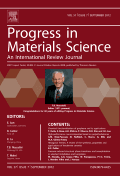
PROGRESS IN MATERIALS SCIENCE
Driving Progress in Material TechnologiesPROGRESS IN MATERIALS SCIENCE is an esteemed peer-reviewed journal published by Pergamon-Elsevier Science Ltd, focusing on pioneering advancements and comprehensive studies in the field of Materials Science. With an ISSN of 0079-6425 and an E-ISSN of 1873-2208, this journal boasts a prestigious status, ranking in the Q1 category for Materials Science (miscellaneous) and achieving a remarkable 99th percentile in Scopus rankings, positioned 4th out of 463 journals in General Materials Science. Published from the United Kingdom, PROGRESS IN MATERIALS SCIENCE provides critical insights into the latest discoveries, trends, and methodologies shaping the materials science landscape, making it an invaluable resource for researchers, professionals, and students alike. Readers can explore rich content on subjects ranging from nanomaterials to biomaterials and beyond, all designed to foster innovation and knowledge dissemination in the materials science community. Although it is not an open-access journal, it remains a pivotal platform for high-quality research and essential discourse in this dynamic field.

Accounts of Materials Research
Leading the charge in open-access materials innovation.Accounts of Materials Research is a premier journal published by the American Chemical Society, focusing on the multidimensional field of materials science. With a robust impact factor and a commitment to open-access research, it serves as a vital platform for leading-edge discoveries from 2020 to 2024. The journal has rapidly ascended to the top quartile in multiple categories, including Chemical Engineering, Materials Chemistry, and Polymers and Plastics, demonstrating its significant influence within the academic community. Recognized by Scopus as a key resource—with remarkable rankings that place it in the 95th percentile of its field—Accounts of Materials Research is devoted to publishing high-quality, innovative research that addresses critical challenges in materials development and implementation. This journal is essential for researchers, professionals, and students seeking to stay informed about the latest advancements and collaborative opportunities within the interdisciplinary landscape of materials science.

Emergent Materials
Advancing Knowledge in Biomaterials and Beyond.Emergent Materials is a leading journal in the fields of biomaterials, ceramics, composites, and environmental science, published by SpringerNature. With an ISSN of 2522-5731 and an E-ISSN of 2522-574X, this journal serves as a crucial platform for researchers and professionals seeking to publish their findings on innovative materials that drive advancements across various applications. Renowned for its impactful contributions, Emergent Materials currently holds a Q2 ranking in Biomaterials and Waste Management, and a prestigious Q1 ranking in Ceramics and Composites for 2023, showcasing its excellence in these dynamic fields. Positioned within Switzerland, the journal supports a wide array of open access research initiatives, allowing for greater dissemination and accessibility of critical scientific knowledge. Spanning over the years 2018 to 2024, the journal aims to publish groundbreaking studies that address global challenges in sustainability, energy, and material disposal. With an impressive Scopus ranking highlighting its impactful presence, generate compelling insights and stay at the forefront of material sciences with Emergent Materials.
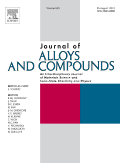
Journal of Alloys and Compounds
Exploring Breakthroughs in Metallurgy and Materials ScienceJournal of Alloys and Compounds, published by Elsevier Science SA, stands at the forefront of materials research, focusing on the properties, applications, and innovations within alloys and compounds. With an impressive impact factor and prestigious rankings placing it in the Q1 quartile across multiple related categories—including Materials Chemistry, Mechanical Engineering, and Mechanics of Materials—this journal is recognized for its significant contributions to the field. Researchers and professionals engaged in metallurgy, materials science, and engineering will find it a critical resource that encompasses groundbreaking studies, insightful reviews, and essential findings. The journal has a strong influence, as evidenced by its Scopus rankings—ranking 14th in Metals and Alloys and 28th in Mechanics of Materials, indicating a robust global impact. As it continues to publish cutting-edge research from 1991 to 2024, the Journal of Alloys and Compounds serves as a vital platform for the exchange of knowledge, thereby advancing our understanding of complex materials and fostering innovation in diverse applications.
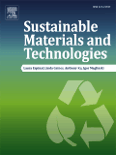
Sustainable Materials and Technologies
Unlocking Potential through Sustainable EngineeringSustainable Materials and Technologies is an esteemed journal published by Elsevier, focusing on pioneering research and innovative solutions in the fields of industrial engineering, materials science, and environmental sustainability. With a prestigious Q1 ranking in multiple relevant categories—including Industrial and Manufacturing Engineering, Materials Science, Renewable Energy, Sustainability, and Waste Management—this journal is positioned as a leading platform for disseminating high-impact research that addresses pressing challenges in material sustainability. Recognized for its rigorous peer-review process and commitment to academic excellence, Sustainable Materials and Technologies is dedicated to providing open access to groundbreaking studies and practical methodologies that drive forward the agenda for a sustainable future. Since its inception in 2014, the journal has been integral for professionals, researchers, and students who are engaged in the quest for innovative materials and technologies that minimize ecological footprints. Join a community at the forefront of sustainability science by contributing to and engaging with the transformative research published in this pivotal journal.
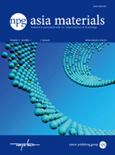
NPG Asia Materials
Exploring Innovative Pathways in Material ResearchNPG Asia Materials, a premier journal published by NATURE PORTFOLIO, stands at the forefront of research in the fields of condensed matter physics, materials science, and modeling and simulation. With an impressive Impact Factor gracing its Q1 rankings in 2023, this open-access journal, established in 2012, offers a vital platform for disseminating high-quality research articles, reviews, and perspectives that advance the understanding of material properties and innovative applications. Based in the United States and catering to a global audience, NPG Asia Materials features cutting-edge contributions that not only enhance academic scholarship but also provoke discussions relevant to both industry and academia. Researchers, professionals, and students are invited to explore its extensive archive of work, covering insights from 2009 to 2024, in a bid to stay abreast of the latest developments in these rapidly evolving scientific domains.